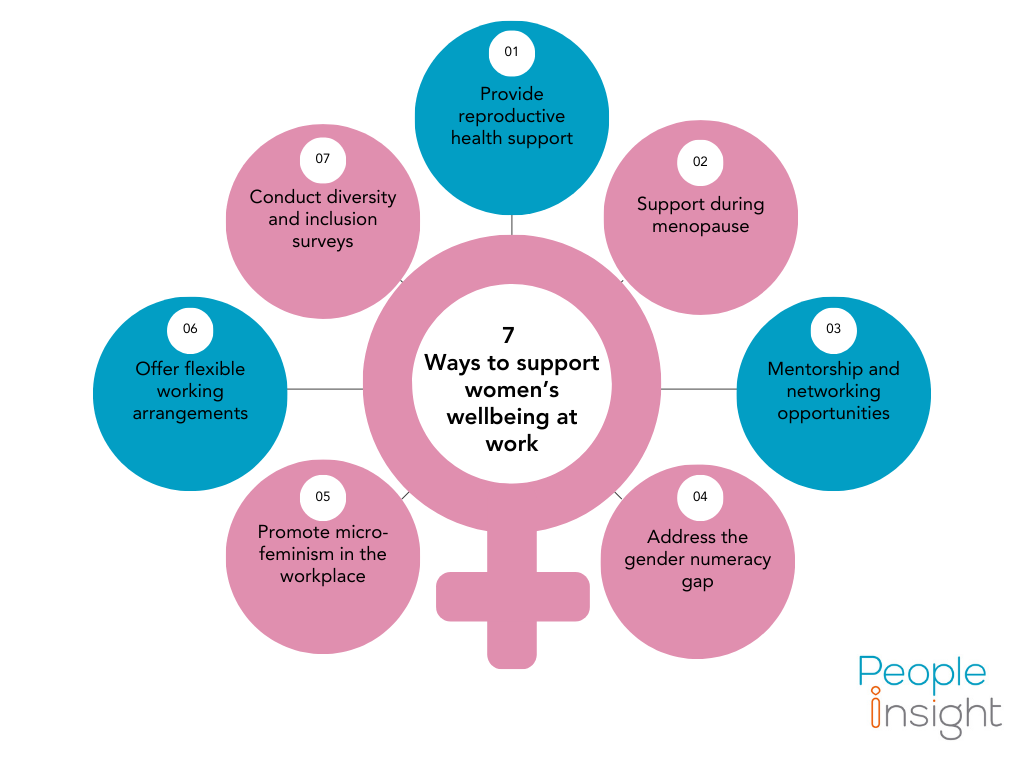
A quick insight: Women’s workplace wellbeing is shaped by factors such as workload, flexibility, inclusion and psychological safety. When these are overlooked, stress and disengagement rise. This post shares practical ways employers can better support women at work, including inclusive policies, supportive leadership and environments where women feel valued, heard and able to thrive.
We all want our people to feel comfortable and supported at work. The thing is, however, that this comfort and support will look different to different people. What works for some people won’t work for another. And when it comes to women in the workplace, forward-thinking businesses are putting extra measures in place to create environments where women can thrive, where their health and career progression are actively supported and where challenges specific to them are understood and addressed.
We all want to do the right thing, but knowing what measures to put in place can be tricky. Let’s take a deeper look at women’s wellbeing at work, how you can support it and why you should.
Women bring a lot of valuable skills to the workplace, but there are unique challenges that can impact their wellbeing in a professional environment. These challenges range from reproductive health issues to gender inequality in career progression, and they require targeted solutions.
Women’s reproductive health issues, including menstruation, pregnancy and menopause, can significantly affect their daily work life. For example, research indicates that as many as seven in 10 women are negatively impacted at work due to menstrual health, including severe pain or fatigue. Employers who don’t accommodate these challenges risk higher absenteeism and disengagement, both of which can negatively affect a team’s overall output.
This is another significant but often overlooked challenge. Women going through menopause may experience symptoms like fatigue, sleep disruption and cognitive difficulties. Studies suggest that over 40% of women experience some form of disruption at work during this time, yet many don’t speak up due to a lack of awareness or fear of being stigmatised.
Research shows that nearly one-third of women believe gender plays a role in their career progression. This can be due to unconscious bias, a lack of mentoring opportunities, and workplace structures that don’t support women’s career development. Studies indicate that women are often less likely to be offered promotions compared to their male counterparts, leading lower levels of employee engagement and morale.
Related: 5 challenges facing women in higher education
Supporting women’s wellbeing at work requires intentional actions from both leadership and management. The following strategies can create a more supportive and inclusive work environment for women.

Employers can implement paid sick leave policies that specifically address reproductive health issues such as menstrual health, pregnancy or miscarriage. Flexible working hours are also a significant benefit, allowing employees to better manage their schedules during challenging times. By offering these types of support, organisations can ease the physical and emotional stress that many women experience. Moreover, having a clear and open policy on these matters encourages transparency and helps to reduce stigma.
Organisations can implement menopause-friendly policies, such as providing options for flexible hours or private spaces for women to rest when needed. Developing awareness and training programmes for managers can be incredibly beneficial in creating a supportive environment. Employees experiencing menopause symptoms should not feel ashamed or uncomfortable discussing them, and employers can help by providing literature, support groups and easy access to medical assistance. This approach not only promotes women’s wellbeing but also boosts loyalty and morale.
One of the most effective ways to boost women’s career progression is through mentorship programmes. Pairing women with mentors, both internal and external to the organisation, can provide invaluable guidance, career advice and emotional support. Networking opportunities, both formal and informal, can also help women expand their professional connections, potentially opening doors for new projects, promotions and career moves. These networks are particularly important when trying to break through the ‘glass ceiling’ that many women face in senior leadership roles.
A surprising issue impacting women’s wellbeing is the gender numeracy gap. Studies show that women are less likely to apply for jobs that require numeracy skills, mainly due to a lack of confidence. Employers can address this by providing training in numeracy or finance, helping women to feel more confident in their abilities. Increasing numeracy skills has been shown to not only improve job performance but also boost women’s confidence in the workplace.
Sometimes the smallest actions can have the greatest impact. Encouraging micro-feminism in the workplace means promoting daily actions that support gender equality, such as crediting women for their work, ensuring their voices are heard in meetings and challenging sexist behaviour. These small gestures help in reducing workplace bias and show women that they are valued. Women who feel supported and respected are more likely to stay with an organisation and perform at their best.
Flexible working has become one of the most important wellbeing initiatives for employees, especially for women who often bear the brunt of family responsibilities. The option to work remotely or adjust working hours allows women to better balance their work and home life, reducing stress and improving job satisfaction. Organisations that support flexible working not only enhance women’s wellbeing but also become more attractive to top talent, ultimately boosting employee retention.
One of the most effective ways to monitor and improve women’s wellbeing is by implementing regular diversity and inclusion surveys. These surveys can help employers understand the specific challenges faced by women in the workplace, providing actionable insights for improvement. Regular feedback from employees helps to create policies that are not only inclusive but also responsive to the needs of the workforce.
Leaders play a central role in creating a workplace that prioritises women’s wellbeing. Leadership commitment is crucial in fostering an organisational culture that recognises and supports the unique needs of female employees.
Promoting women’s wellbeing at work is a step towards building a more inclusive and supportive workplace. It’s clear that when organisations actively support women’s unique needs — whether related to reproductive health, career development or flexible working — they not only enhance employee wellbeing but also improve overall productivity and job satisfaction.
By implementing these strategies, organisations can create a culture where women are empowered to thrive.
At People Insight, we specialise in helping organisations enhance diversity and inclusion through tailored surveys. These surveys provide valuable insights into the experiences of your employees and help identify key areas for improvement.
Contact us today to learn how our diversity and inclusion surveys can help your organisation support women’s wellbeing in the workplace. We can also discuss measuring and improving women’s wellbeing at work with a staff wellbeing survey or focus group.

